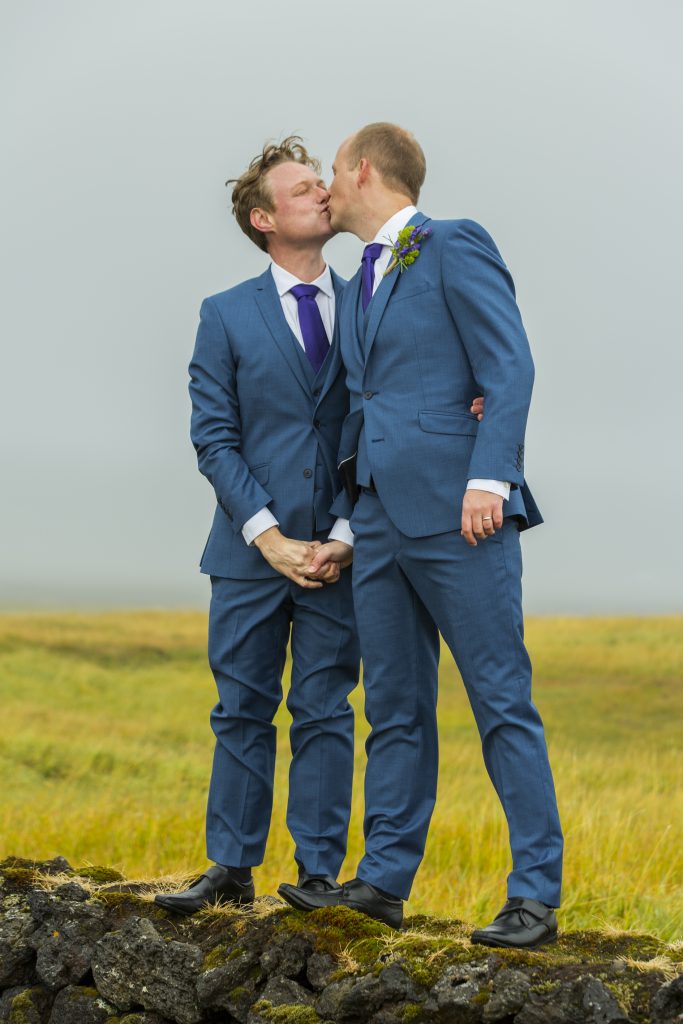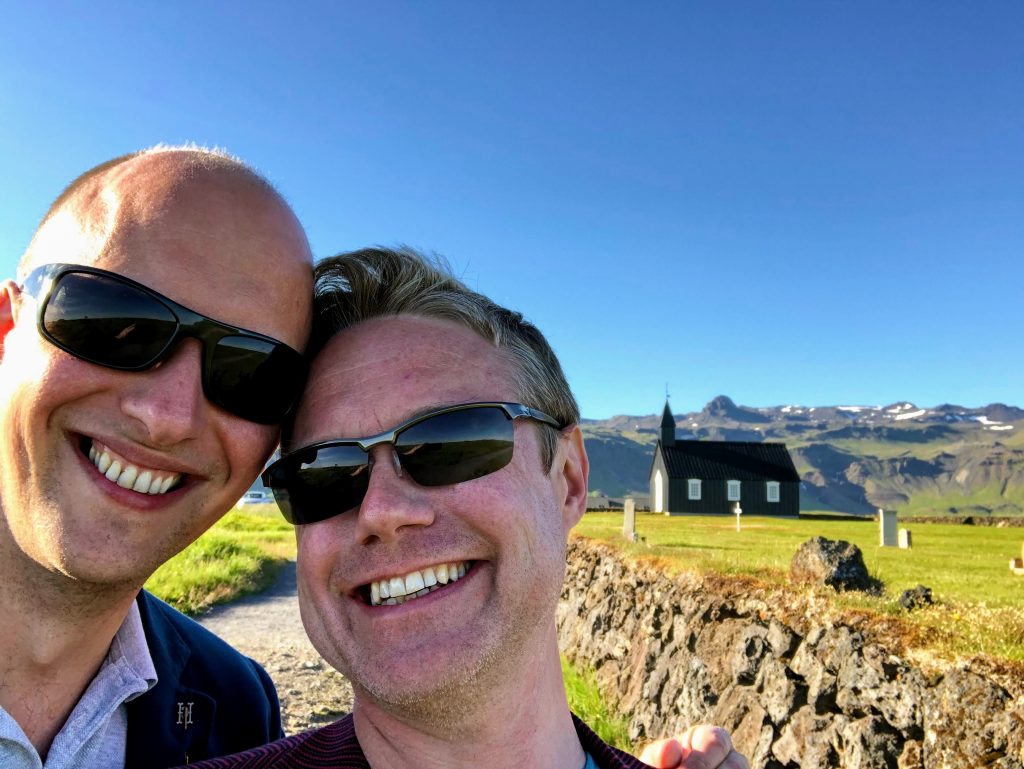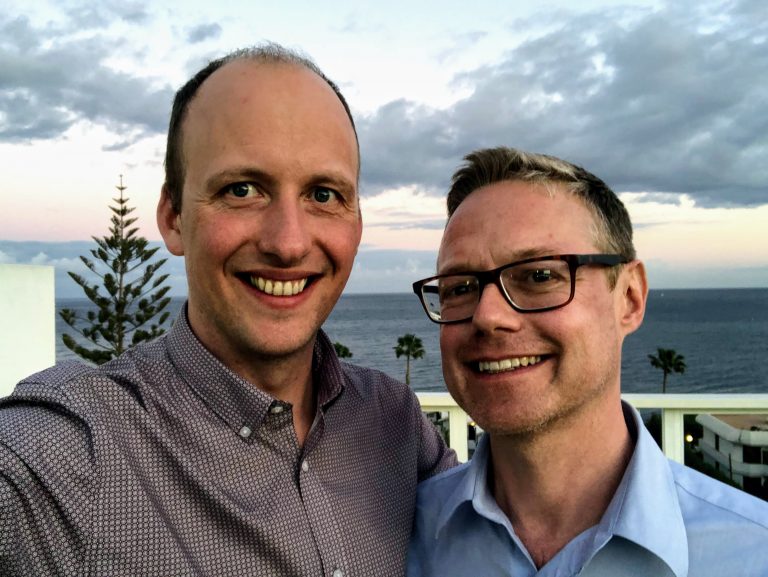While most of the world continues to grapple with questions of masks, hand sanitizer, and social distancing, Scott and Snorri Danielson are busy with questions of car seats, baby blankets, and parental leave. The Faroese couple are preparing to have a baby, and their excitement is palpable. “We just had the 3D scan,” Scott says. “It’s amazing and terrifying at the same time.”

Scott and Snorri have been wanting to have a child for years. The couple met in Denmark nine years ago and lived in the UK, where Scott is from, for five years before moving to the Faroe Islands last year.
“We looked into adopting in the UK but as a same sex couple it’s very difficult to do international adoption, because many countries wont allow a same sex couples to adopt,” Scott says. One of the options in the UK was to adopt an older child with significant special needs, but they realized that wouldn’t be practical. “One of us would have had to give up work. And are we ready for that? I’m not sure.”
“It wasn’t really possible,” Snorri says. “I think we went through a bit of a grieving process, a period of saying, ‘We would like a child but we can’t make it work.’ And we tried to redefine ourselves and say, ‘Actually we will just be the two of us and that’s okay’.”
“This is not a political statement, this is having a child.”
The couple continued to live like that until three years ago, when they were talking with a friend in the Faroes about having a child together. “We were just talking generally,” Snorri says. “She was talking about having a child, and after that conversation she contacted us and we started carefully approaching the topic of how something like this would look. We looked at our own values and her values, what we would want and what she would want.”
“It turned out we all pretty much wanted the same thing,” Scott says. The three settled on an arrangement where the couple and their friend would each share half of the childcare responsibilities. “It’s not like she’s going to be more or less a fulltime mother and we’re playing some kind of uncle supporting role, or that she’s having a child like a surrogate for us.”
“It’s quite egalitarian,” Snorri says. “The way I explain it is it’s like a divorce but without the trauma. She’s living just a five minute walk away, so it’s quite doable.”
“It’s a bit more boring than people think,” he adds. “People ask, ‘What does that mean?’ And then they look at the family and the relationships and they’re like, ‘Oh, that’s quite normal.’ ”
Tolerance in the Faroes
As far as Scott and Snorri know, there are no other families quite like theirs currently living in the Faroes. “Somebody has to be the first,” Scott says.
For people in Iceland hearing Scott and Snorri’s story, it may come as a surprise that they are planning to have this queer blended family in the Faroes. For years, the Faroe Islands have been seen by many in Iceland as less progressive and less tolerant than their North Atlantic neighbours. But Scott and Snorri don’t think that’s entirely fair.
“The Faroes have a terrible reputation in Iceland for being kind of homophobic, which isn’t entirely justified. I think it’s a little bit out of date,” Scott says. “The Faroes have changed hugely in recent years, from what I see as an outsider. Marriage equality came in here a few years back and it was supported by the majority of the population. But it still has that reputation for being more homophobic than perhaps it is.”
Snorri grew up on the island of Bordoy, in the north of the country, which he describes as being very isolated. “All you know is within a 20 minute drive, and I think that island mentality shapes you a wee bit because all of a sudden you are completely dependent on everyone around you,” Snorri says. “You do not have the same luxury as you do somewhere else to say, ‘I choose to spend time with you because we have the same interests.’ You have to be a little bit more tolerant in a way.”
“People ask, ‘What does that mean?’ And then they look at the family and the relationships and they’re like, ‘Oh, that’s quite normal.’ ”
“The other side of the island culture is being isolated, which means that the opinions that are formed are very narrow,” he adds. “You are not exposed to people who think differently than you do. It’s essentially a very homogenous society and those social boundaries sort of keep you in check. That means that if the country thinks that homosexuality is outside of the norm or something that’s unknown, all social structures within that society will sort of push people in that direction.”
Snorri says that the benefit of this island culture is that when things start to change, they can change rapidly. “These things that were outside of the norm, all of a sudden people start saying, ‘Well, I actually do not fit into the norm.’ And they start questioning that norm,” Snorri says. “All of a sudden that tolerance of being an island society sort of wins over and says, ‘Well, actually we need to change the norm.’ ”
Not a political statement

When asked whether they are worried about stigma or negative comments from people in the Faroes, the couple says they aren’t too concerned. “It’s not as daunting as the whole business of just having a child,” Scott says. “That’s the main event here. Other issues of societal prejudice around us are kind of secondary and something that I think we’re both long in the tooth enough to be able to deal with.”
“This is not a political statement, this is having a child,” Snorri adds. “Do I expect in the coming years that I will have some weird conversations? Yeah, I do. I’m very aware that some people might slander or something. But it’s our job to go into that head first and make sure that they are educated in such a way that they do not harm our child. But it’s not a political statement.”
The couple are expecting their child in mid-September, which means right now they’re asking the same questions that every expectant parent asks in the last couple months: Do we have the right car seat? Do we need another blanket? Are we ready to have a child?
“We were having that conversation with the mother the other day,” Scott says. “We had this sudden realization that it’s all going to be okay. If we don’t have this piece of equipment, it doesn’t matter. We’ll go and buy it if we need it.”
“We realize that we’re never going to be ready,” Snorri adds. “We haven’t met this child, and how can you be ready for something you’ve never met?”


